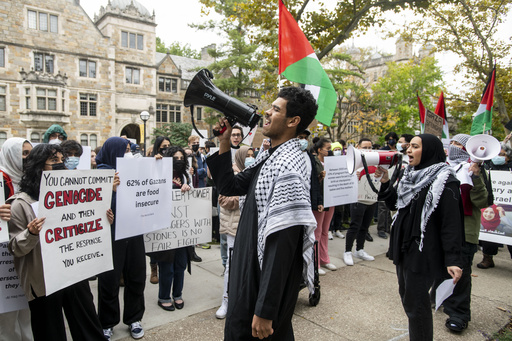
LANSING, Mich. — Jonathan Zou, a second-year student at the University of Michigan, is among many students who took part in pro-Palestinian demonstrations at college campuses across the nation this past year. While the fervor of these protests has diminished, the consequences for students like Zou linger on.
After being arrested by university police on October 7 for using a megaphone during a pro-Palestinian rally, Zou has been barred from all campus locations of the University of Michigan, with exceptions made only for classroom attendance and medical services. He is one of five individuals who have been subjected to similar restrictions and are appealing for justice through a lawsuit filed by the American Civil Liberties Union (ACLU). The lawsuit accuses the University of Michigan of infringing upon their right to free speech and claims the institution misused its authority to impose bans on public spaces.
“The university expresses support for the tradition of activism, yet it resorts to arresting, banning, and monitoring students, using legal or disciplinary methods to suppress them,” Zou stated in a pre-filing interview. In response to inquiries, a spokesperson for the University of Michigan remarked that the institution had not yet received the lawsuit and refrained from further comments.
Last spring, nationwide pro-Palestinian protests surged on college campuses, with activists establishing encampments, sometimes escalating their demonstrations. The scale of the protests led to thousands of arrests; most of those detained had their charges dismissed, but some find themselves navigating ongoing legal challenges while continuing their studies.
Recently, President Donald Trump issued an executive order aimed at combating antisemitism on college campuses, pledging to take legal action against offenders and threaten visa revocation for international students deemed to be supportive of Hamas.
The state of Michigan, particularly the metro Detroit area, has been significantly impacted by the ongoing tensions stemming from the Israel-Hamas conflict, known for hosting the largest Arab American community in the U.S. alongside a substantial Jewish population. This context has led to heightened unrest on the University of Michigan’s campuses, with police confrontations occurring during protests and demonstrators challenging university regents.
In the previous week, the University of Michigan imposed a two-year suspension on a pro-Palestinian organization, withdrawing its funding after alleging breaches of the university’s conduct standards. The lawsuit from the ACLU advocates for Zou and another current student, two recent alumni, and an Ann Arbor community member. The plaintiffs claim they received trespass orders due to alleged misbehavior at protests, but were never officially charged concerning those claims.
Zou’s arrest occurred during a march on campus coinciding with the one-year anniversary of the Hamas attack on Israel, which resulted in the deaths of 1,200 individuals, alongside another 250 hostages. This attack triggered a war that has inflicted significant damage on the already beleaguered Gaza Strip.
Despite being detained for his actions at the march, Zou has not faced any formal charges. The trespassing orders have disrupted the daily lives of those involved, as detailed in the lawsuit, impacting their education, work opportunities, and hindering their rights to express their views and protest across the university’s expansive campus. They are seeking a federal court’s intervention to remove these bans and to prevent similar overarching restrictions in the future.
A ceasefire was established last month between Hamas and Israel, resulting in exchange arrangements for hostages and an influx of aid to the Gaza Strip, which has endured a fifteen-month war characterized by widespread destruction, hunger, and displacement. There are increasing concerns that hostilities might resume if the ceasefire collapses, especially as the initial six-week phase attracts attention.

